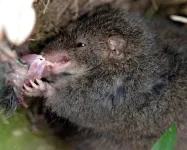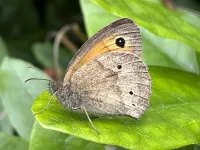(Press-News.org) Associate Professor Andrew Baker from QUT School of Biology and Environmental Science said antechinuses are carnivorous marsupials well-known for suicidal sex sessions where all males die after the 1 to 3 week breeding period.
“During the breeding season, male and females mate promiscuously in frenzied bouts lasting as long as 14 hours. Certain stress-induced death follows for all males as surging testosterone causes cortisol to flood uncontrolled through the body, reaching pathological levels,” Professor Baker said.
“The males drop dead, which provides an opportunity for cheap energy gain via cannibalism for still-living males and pregnant or lactating female antechinuses.
“While cannibalistic behaviour has been reported in some dasyurids (the family which includes antechinuses, quolls and Tasmanian devils), it is very rare to observe in the wild.”
The photos of a mainland dusky antechinus (Antechinus mimetes) eating a dead member of its own species were taken on a trek to Point Lookout in New England National Park, NSW in August 2023.
Professor Baker said both the eaten and the eater in the photos were identified as mainland dusky antechinuses based on a combination of body size, foreclaw length, small ears and eyes, fur colour and shagginess, along with the capture location.
“In places such as Point Lookout where two antechinus species (Antechinus mimetes and the brown antechinus, A. stuartii) are living in the same area, the two slightly separated breeding periods provide the opportunity to cannibalise both their own and the other species.
“Each species may benefit from eating dead males of the other.
“For the earlier-breeding antechinus species, it may mean that pregnant and lactating females can get high-energy food by cannibalising the males of the later-breeding species as they die off.
“For the later-breeding species, both sexes may take the opportunity to cannibalise dead males of the earlier-breeding species, to help stack on weight and condition before their own breeding period commences.
“In the present study, the sex of the animal eating the dead antechinus is uncertain but it is most likely a male. Although males are believed to eat less than females during breeding, both sexes are known to eat at that time.
“The antechinus seen feeding on its dead comrade appeared vigorous and large-bodied, but it had damage to its right eye and hair loss on its arms and shoulders, which is associated with stress-induced decline in males. He was perhaps destined soon to become somebody else’s meal.”
Cannibalism in the mainland dusky antechinus (Antechinus mimetes mimetes) during the breeding period was published in Australian Mammalogy and involved involved a research team including Elliot Bowerman (Sunshine Coast Council) and Dr Ian Gynther (Department of Environment, Science and Innovation).
END
Mini marsupial goes from sex fests to cannibal feasts
New observations of sex-crazed marsupials' dark habits
2024-01-18
ELSE PRESS RELEASES FROM THIS DATE:
Researchers pump brakes on ‘blue acceleration’ harming oceans
2024-01-18
Protecting the world’s oceans against accelerating damage from human activities could be cheaper and take up less space than previously thought, new research has found.
The University of Queensland’s Professor Anthony Richardson collaborated on the study, which looks to halt the rapid decline of marine biodiversity from expanding industrial activities in marine areas beyond national jurisdictions (ABNJ).
“This ‘blue acceleration’ as we call it, has seen a greater diversity of stakeholders interested in ABNJs, such as the high seas and the international seabed beyond exclusive economic zones,” ...
Winding down the window, drinking tea and coffee, turning the radio up and singing while driving could be signs of a dangerous snoring condition
2024-01-18
Frequently using more than three strategies to stay alert while driving could be a sign of excessive sleepiness due to obstructive sleep apnoea (OSA), according to a study published today (Thursday) in ERJ Open Research [1].
People with OSA often snore loudly, their breathing starts and stops during the night, and they may wake up several times. Around one in five people are estimated to have OSA but the majority of sufferers do not realise they have a problem. OSA causes excessive sleepiness and people with untreated OSA are at higher risk of collisions on the road.
Researchers say that asking people ...
Ditches and ponds can be the sources or sinks of non-point source pollution: observations in an upland area in the Jinglinxi catchment, China
2024-01-18
Globally, non-point source pollution is an important source of water quality deterioration in rivers and lakes. A ditch-pond system, consisting of ditches and ponds, is considered to be similar to free-surface wetlands, linking pollution sources to the receiving water bodies. The ditch-pond system includes vegetation, microorganisms and sediment, which can slow down the flow velocity and promote the precipitation of particulate matter carried by running water. At the same time, ditch and pond systems reduces nitrogen and phosphorus concentrations, and those of other nutrients entering the downstream water by means of plant absorption, sediment adsorption and microbial degradation, ...
The Lancet Child & Adolescent Health: Paediatric care for non-White children is universally worse across the USA; policy reform urgently needed to address disparities
2024-01-18
The Lancet Child & Adolescent Health: Paediatric care for non-White children is universally worse across the USA; policy reform urgently needed to address disparities
Two-paper Series identifies pervasive racial inequities in paediatric care in the USA, and outlines policies to address structural racism embedded in wider sectors of society that shape children’s health.
A review of recent evidence reveals widespread patterns of inequitable care across paediatric specialties, including neonatal care, emergency medicine, surgery, developmental disabilities, mental ...
How Covid variants can be detected more rapidly than ever
2024-01-18
Peer reviewed – observational study - humans
Genotyping technology detects Covid variants more quickly and cheaply than ever before – according to research from the University of East Anglia and the UK Health Security Agency.
A new study published today reveals that the technique detects new variants almost a week more quickly than traditional whole genome sequencing methods.
The research team say that genotyping allowed Covid variant information to be more rapidly detected and communicated to frontline health protection professionals at the height of the pandemic.
Importantly, it helped to implement ...
Obsessive-compulsive disorder linked to heightened risk of death
2024-01-18
People with obsessive-compulsive disorder (OCD) may have an increased risk of death from both natural and unnatural causes than those without the disorder, finds a study from Sweden published by The BMJ today.
The researchers point out that many of the natural causes of death are preventable, suggesting that better surveillance, prevention, and early intervention strategies should be implemented to reduce the risk of fatal outcomes in people with OCD.
OCD is typically a long term psychiatric disorder affecting about 2% of the population. It is characterised ...
No benefit of physiotherapy over general advice after dislocated shoulder
2024-01-18
Routinely referring patients to a tailored programme of physiotherapy after a dislocated shoulder is no better than a single session of advice, supporting materials and the option to self-refer to physiotherapy, finds a clinical trial published by The BMJ today.
The findings should help clinicians and patients have informed discussions about the best approach to non-operative rehabilitation, say the researchers.
The shoulder is the most frequently dislocated joint, with rates highest in men aged 16-20 years ...
Concerns over new laws that could end use of Whatsapp in the NHS
2024-01-18
UK law changes pose a threat to the security of messaging apps – and therefore their use in the NHS. In The BMJ today, doctors warn that patient care will suffer if they can no longer use apps such asWhatsApp and Signal to share information.
In March 2020, in the face of the pandemic, clinicians were officially allowed to use messaging services such as WhatsApp “where the benefits outweigh the risk,” reversing years of caution about their use in patient care – provided ...
Fewer than 1% of schools in England have full policies on second languages, language learning and English
2024-01-18
A tiny fraction of schools in England – about three in every 500 – have whole-school policies which address foreign languages, English usage, and integrating students who speak English as an additional language (EAL), new research indicates.
The study of almost 1,000 secondary schools, by researchers at the University of Cambridge, questions many schools’ claims to being ‘inclusive’ spaces that value the linguistic diversity of their communities. It also suggests that language learning, and an appreciation of different languages, is being deprioritised, conflicting with Government ambitions for 90% of students to study a ...
Butterflies could lose spots as climate warms
2024-01-18
Female Meadow Brown butterflies have fewer spots if they develop in warmer weather – so climate change could make them less spotty, new research shows.
University of Exeter scientists found females that developed at 11°C had six spots on average, while those developing 15°C had just three.
The findings challenge long-held scientific views about why these butterflies have varying numbers of spots.
“Meadow Browns always have large ‘eyespots’ on their forewings, probably for startling predators,” said Professor Richard ffrench-Constant, from the Centre for Ecology and Conservation on Exeter’s Penryn Campus in Cornwall.
“They ...
LAST 30 PRESS RELEASES:
Yale study challenges notion that aging means decline, finds many older adults improve over time
Korean researchers enable early detection of brain disorders with a single drop of saliva!
Swipe right, but safer
Duke-NUS scientists identify more effective way to detect poultry viruses in live markets
Low-intensity treadmill exercise preconditioning mitigates post-stroke injury in mouse models
How moss helped solve a grave-robbing mystery
How much sleep do teens get? Six-seven hours.
Patients regain weight rapidly after stopping weight loss drugs – but still keep off a quarter of weight lost
GLP-1 diabetes drugs linked to reduced risk of addiction and substance-related death
Councils face industry legal threats for campaigns warning against wood burning stoves
GLP-1 medications get at the heart of addiction: study
Global trauma study highlights shared learning as interest in whole blood resurges
Almost a third of Gen Z men agree a wife should obey her husband
Trapping light on thermal photodetectors shatters speed records
New review highlights the future of tubular solid oxide fuel cells for clean energy systems
Pig farm ammonia pollution may indirectly accelerate climate warming, new study finds
Modified biochar helps compost retain nitrogen and build richer soil organic matter
First gene regulation clinical trials for epilepsy show promising results
Life-changing drug identified for children with rare epilepsy
Husker researchers collaborate to explore fear of spiders
Mayo Clinic researchers discover hidden brain map that may improve epilepsy care
NYCST announces Round 2 Awards for space technology projects
How the Dobbs decision and abortion restrictions changed where medical students apply to residency programs
Microwave frying can help lower oil content for healthier French fries
In MS, wearable sensors may help identify people at risk of worsening disability
Study: Football associated with nearly one in five brain injuries in youth sports
Machine-learning immune-system analysis study may hold clues to personalized medicine
A promising potential therapeutic strategy for Rett syndrome
How time changes impact public sentiment in the U.S.
Analysis of charred food in pot reveals that prehistoric Europeans had surprisingly complex cuisines
[Press-News.org] Mini marsupial goes from sex fests to cannibal feastsNew observations of sex-crazed marsupials' dark habits




